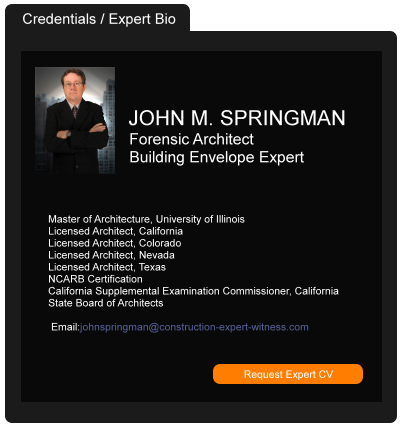Florida Courts Say that Developers Are Responsible for Flooding
July 31, 2013 —
CDJ STAFFThe Florida Supreme Court recently handed down a decision that developers can be held responsible if problems with infrastructure lead to damage to homes. Aaron Kase, writing on Lawyers.com, reviews the case, noting that the court said that “habitability of a home is impacted by stagnant standing water and the erosion of soil upon which the home is constructed. One need not wait until floodwaters inundate the home or the erosion swallows the residential structure to find protection.”
Kase notes that a trial court “sided with the developers’ argument that because the water infrastructure didn’t immediately support the houses, implied warranties of fitness and habitability shouldn’t apply and they shouldn’t be liable.” This was overturned at the district court, with the Supreme Court upholding the district court decision. Lisa Wilcox of Wilcox Law notes that “the Supreme Court determined that the warranty of habitability should be applied to protect home buyers from defects in the construction of these essential services even though they are not part of a home’s completed structure.”
Read the court decisionRead the full story...Reprinted courtesy of
Recent Developments Involving Cedell v. Farmers Insurance Company of Washington
September 05, 2022 —
Donald Verfurth, Sally Kim, Stephanie Ries & Kyle Silk-Eglit - Gordon & Rees Insurance Coverage Law BlogEver since the Washington Supreme Court’s 2013 decision in Cedell v. Farmers Insurance Company of Washington, 176 Wn.2d 686, 295 P.3d 239 (2013), insurance coverage attorneys have been struggling to define the exact parameters of the Cedell ruling in order to safeguard the attorney-client privilege as to the communications between the insurer and its counsel. As a brief background, the Washington Supreme Court held in Cedell that there is a presumption of no attorney-client privilege in a lawsuit involving bad faith claims handling. However, an insurer can overcome the presumption of no attorney-client privilege by showing that its counsel provided legal advice regarding the insurer’s potential liability under the policy and law, and did not engage in any quasi-fiduciary activities, i.e. claims handling activities, such as investigating, evaluating, adjusting or processing the insured’s claim.
Since Cedell, various trial courts have held that the following activities by an insurer’s counsel constitute quasi-fiduciary conduct that do not overcome the presumption of no attorney-client privilege, resulting in an order to produce documents and/or to permit the deposition of the insurer’s counsel:
- Insurer’s attorney being the primary or sole point of contact with the insured for the insurer;
- Insurer’s attorney requesting documents from the insured that are relevant to the investigation of the claim;
- Insurer’s attorney communicating directly with the insured or the insured’s counsel regarding claims handling issues or payments;
- Insurer’s attorney interviewing witnesses for purposes of the investigation of the claim;
- Insurer’s attorney conducting an examination under oath of the insured;
- Insurer’s attorney drafting proposed or final reservation of rights letter or denial letter to the insured; and
- Insurer’s attorney conducting settlement negotiations in an underlying litigation.
Reprinted courtesy of
Donald Verfurth, Gordon Rees Scully Mansukhani,
Sally Kim, Gordon Rees Scully Mansukhani,
Stephanie Ries, Gordon Rees Scully Mansukhani and
Kyle Silk-Eglit, Gordon Rees Scully Mansukhani
Mr. Verfurth may be contacted at dverfurth@grsm.com
Ms. Kim may be contacted at sallykim@grsm.com
Ms. Ries may be contacted at sries@grsm.com
Mr. Silk-Eglit may be contacted at ksilkeglit@grsm.com
Read the court decisionRead the full story...Reprinted courtesy of
Punchlist: The News We Didn’t Quite Get To – May 2016
May 12, 2016 —
Garret Murai – California Construction Law BlogIf you’re a solar contractor make sure you don’t get burned. The California Contractors State License Board (“CSLB”) is taking a closer look at solar contractors as the industry grows in the Golden State. Only contractors holding a Class “A” Engineering, Class “B” General Contractor, or Class C-46 Solar license can perform solar construction and installation.
The CSLB has clarified that C-39 Roofing contractors can install installation as part of an overall roofing job. The CSLB considers such insulation work as “incidental and supplemental” under Section 831 of the California Code of Regulations and does not require a separate C-2 Insulation and Acoustical contractor license.
Read the court decisionRead the full story...Reprinted courtesy of
Garret Murai, Wendel Rosen Black & Dean LLPMr. Murai may be contacted at
gmurai@wendel.com
Will They Blow It Up?
March 28, 2012 —
CDJ STAFFThe issues concerning the Harmon Towers building in Las Vegas continue to make their way through the courts. As we noted in a previous piece, Cook County building officials stated that the building could be a hazard if Las Vegas were struck by an earthquake. The question of whether the building will continue to stand is just one of the issues in front of a judge.
�MGM Resorts International argued at a March 13 hearing for permission to implode the Harmon hotel building. They claim that more than 1,700 defects have been discovered in the building and that the building is a public safety hazard. Arguing against demolition, Perini Building Company, the general contractor for the hotel, and its subcontractors are claiming that imploding the building would destroy evidence and prejudice juries in the ongoing construction defect claims. They claim that MGM Resorts wishes to abandon the building due to the economic slowdown. Perini Corp, the contractor for the project, claims that the building can be fixed. Perini claims that MGM’s position in the construction trial would be improved if the building is demolished.
�After Judge Elizabeth Gonzalez heard the four days of testimony on the Harmon Towers building and whether it should be demolished, she scheduled more testimony, with two days in April and an entire week in July. Judge Gonzalez will be deciding whether the building will be torn down, imploded, or left in place.
Read the full story…
�Read the full story…
Read the court decisionRead the full story...Reprinted courtesy of
Gone Fishing: Tenant’s Insurer Casts A Line Seeking To Subrogate Against The Landlord
October 17, 2022 —
William L. Doerler - The Subrogation StrategistIn J&J Fish on Ctr. Str., Inc. v. Crum & Forster Specialty Ins. Co., No. 20-cv-644-bhl, 2022 U.S. Dist. LEXIS 16361, the United States District Court for the Eastern District of Wisconsin (District Court) recognized that “[t]here will be no further fish fries on Center Street until someone pays to repair the collapsed floor at J&J Fish on Center Street, Inc. (J&J Fish).” The contenders were: 1) J&J Fish; 2) its’ insurer, Crum & Forster Specialty Insurance Company (Insurer); and 3) J&J Fish’s landlord, Vision Land, LLC (Vision). Recognizing Insurer’s right to subrogate against Vision based on the terms of the parties’ lease, the District Court held Insurer owed J&J Fish coverage for the losses it sustained, but that Insurer could subrogate against Vision for anything it had to pay J&J Fish.
In J&J Fish, Vision and J&J Fish signed a lease (Lease) for a building (the Building) located in Milwaukee, Wisconsin. The Lease required Vision to “purchase and keep in full force and effect on the building(s) . . . insurance against fire and such other risks as may be included in all-risks policies . . .” Vision, however, never obtained any insurance on the Building. Pursuant to the Lease, Vision also agreed to “maintain and repair the structure including the slab floor and exterior walls of the Premises.”
With respect to J&J Fish, the Lease required J&J Fish to maintain “Physical Damage insurance, including but not limited to fire . . . and all other risks of direct physical loss as insured . . . for the full replacement cost of all additions, improvements (including leasehold improvements) and alterations to the Premises.” J&J Fish purchased a commercial property and casualty insurance policy (the Policy) from Insurer. The Policy covered “additions, improvements . . . and alterations” as the Lease required. In addition, it insured the Building itself against “collapse,” subject to certain exceptions.
Read the court decisionRead the full story...Reprinted courtesy of
William L. Doerler, White and Williams LLPMr. Doerler may be contacted at
doerlerw@whiteandwilliams.com
The Connecticut Appellate Court Decides That Construction Contractor Was Not Obligated To Continue Accelerated Schedule to Mitigate Its Damages Following Late Delivery of Materials by Supplier
April 11, 2022 —
Robert M. Barrack - Gordon & ReesIn United Concrete Prods. v. NJR Constr., LLC, 207 Conn. App. 551, 263 A.3d 823 (2021), the Connecticut Appellate Court has issued a decision that should be of interest to the Connecticut construction industry and the construction bar. The lawsuit arose out of the late delivery of materials on a construction project, which is a frequent problem on construction projects. In United Concrete Products, the defendant general contractor, NJR Construction, LLC (“NJR”) was retained by the State of Connecticut Department of Transportation (“DOT”) to replace a bridge over the Hockanum River (“Project”). Id. at 555-58 (2021). The Prime Contract provided that NJR with an eight-week time-frame to perform the work, at which time the road would be closed to traffic. Id. The Prime Contract also provided for a bonus of $3,000 for each day the road was opened to traffic prior to the eight week deadline of August 8, 2016, and for liquidated damages of $3,000 for each day the road remained closed beyond the deadline. Id.
NJR subsequently entered into a purchase order (“Subcontract”) with the plaintiff, United Concrete Products, Inc. (“United”), whereby United agreed to provide certain concrete components for the Project, including ten pre-stressed concrete beams. Id. The Subcontract required that United deliver the concrete beams by June 7, 2016, but, NJR did not actually schedule the delivery until June 29, 2016. Id. Nevertheless, even with that schedule NJR could have reopened the road by July 19, 2016, which would have allowed it to receive the full $60,000 incentive bonus. However, United did not deliver the concrete beams until July 26, 2016, which caused NJR to lose the incentive bonus, be assessed liquidated damages by the DOT, and to incur additional delay damages. Id. After deducting the amount of $179,500 in damages that it incurred due to United’s late delivery of the beams, NJR paid United the balance of $66,074.75. Id.
Read the court decisionRead the full story...Reprinted courtesy of
Robert M. Barrack, Gordon Rees Scully Mansukhani, LLPMr. Barrack may be contacted at
rbarrack@grsm.com
Property Damage, Occurrences, Delays, Offsets and Fees. California Decision is a Smorgasbord of Construction Insurance Issues
November 15, 2017 —
Garret Murai - California Construction Law BlogI read once that 97 percent of cases never go to trial. However, there are still the ones that do. And, then, there are the ones that do both. The following case, Global Modular, Inc. v. Kadena Pacific, Inc., California Court of Appeals for the Fourth District, Case No. E063551 (September 8, 2017), highlights some of the issues that can arise when portions of cases settle and other portions go to trial, the recovery of delay damages on a construction project through insurance, and the recovery of attorneys’ fees.
Global Modular, Inc. v. Kadena Pacific, Inc.
The U.S. Department of Veterans Affairs contracted with general contractor Kadena Pacific, Inc. (Kadena) to oversee construction of its Center for Blind Rehabilitation in Menlo Park, California. Kadena, in turn, contracted with subcontractor Global Modular, Inc. (Global) to construct, deliver and install 53 modular units totaling more than 37,000 square feet for a contract price of approximately $3.5 million.
Read the court decisionRead the full story...Reprinted courtesy of
Garret Murai, Wendel Rosen Black & Dean LLPMr. Murai may be contacted at
gmurai@wendel.com
New York Bars Developers from Selling Condos due to CD Fraud Case
October 15, 2014 —
Beverley BevenFlorez-CDJ STAFFAccording to GlobeSt, New York “Attorney General Eric T. Schneiderman has announced a settlement agreement that bars developers Joseph Scarpinito and Shiraz Sanjana—and five affiliated entities they own and operate—from offering or selling securities, including condo and coop sales, in or from New York State.”
The settlement is in “result of an investigation by the Attorney General’s real estate finance bureau into allegations of fraud by the developers of the Mirada, an eight-story Harlem condominium.” GlobeSt also stated that the agreement “provides for binding arbitration with the condo purchasers for alleged construction defects, and requires the developers to pay $500,000 in penalties and fines to New York State.”
Read the court decisionRead the full story...Reprinted courtesy of


































































